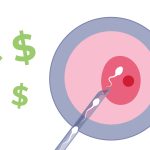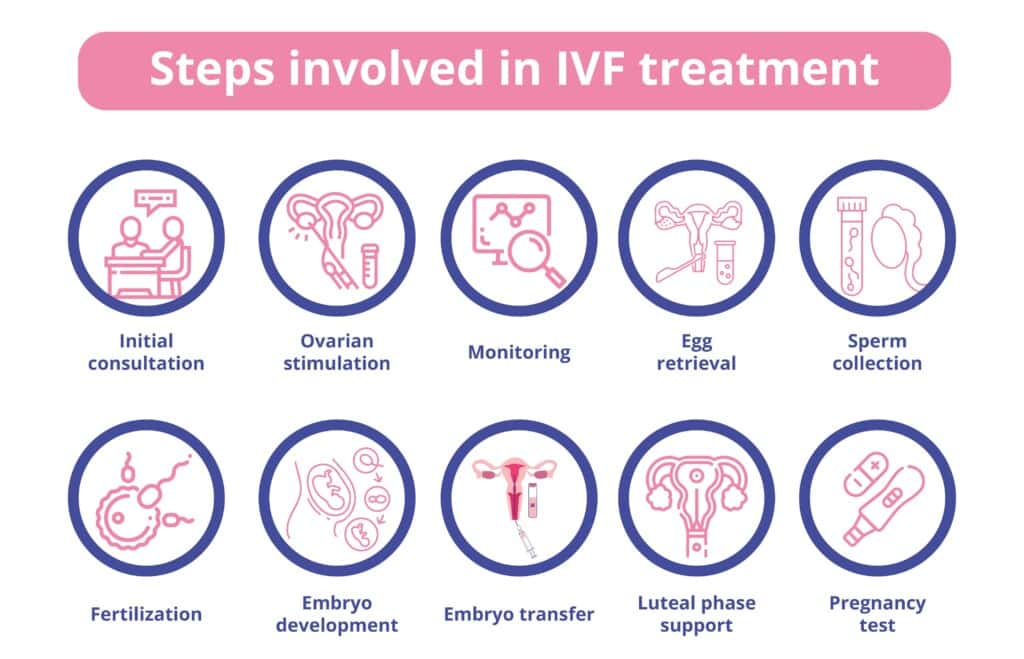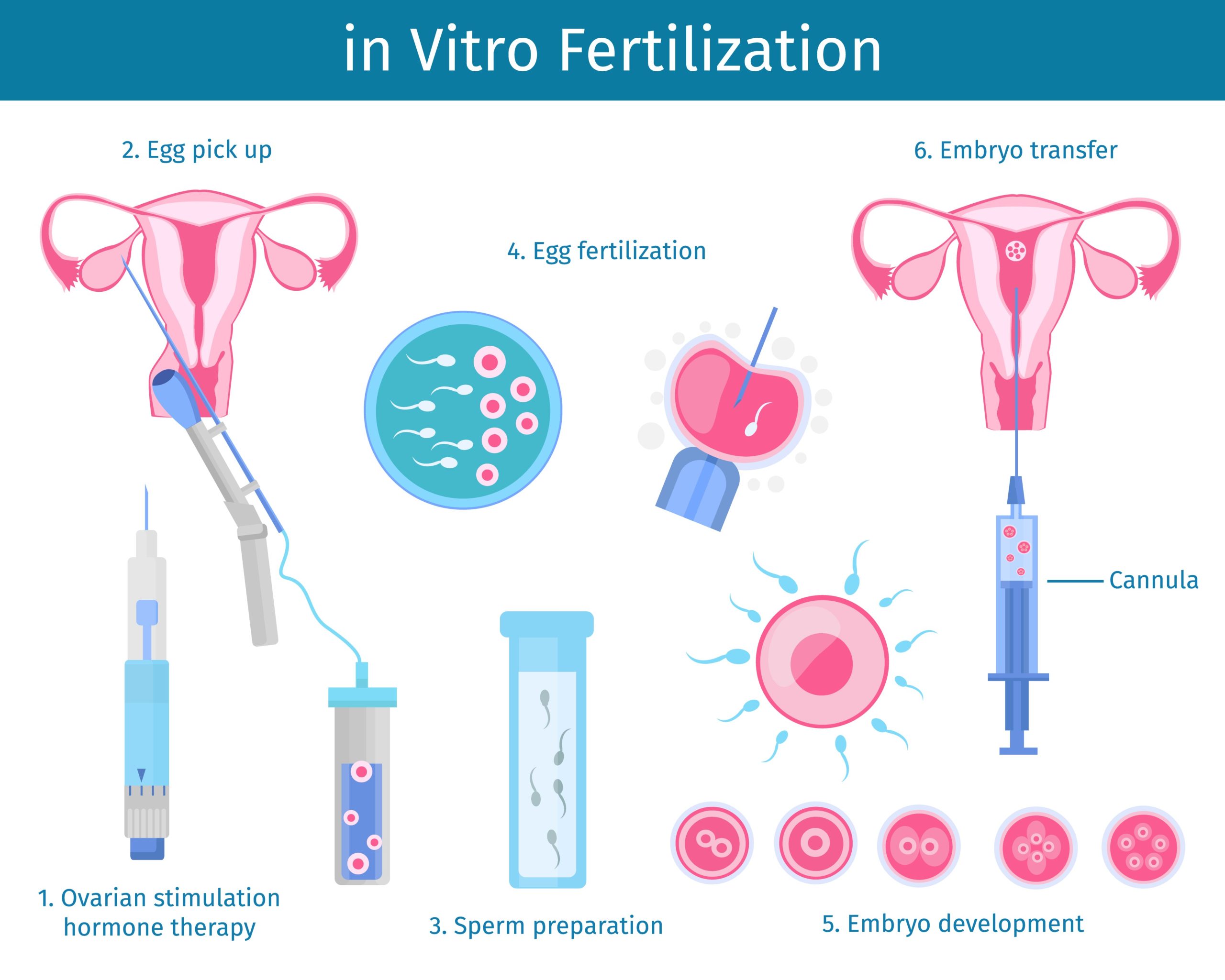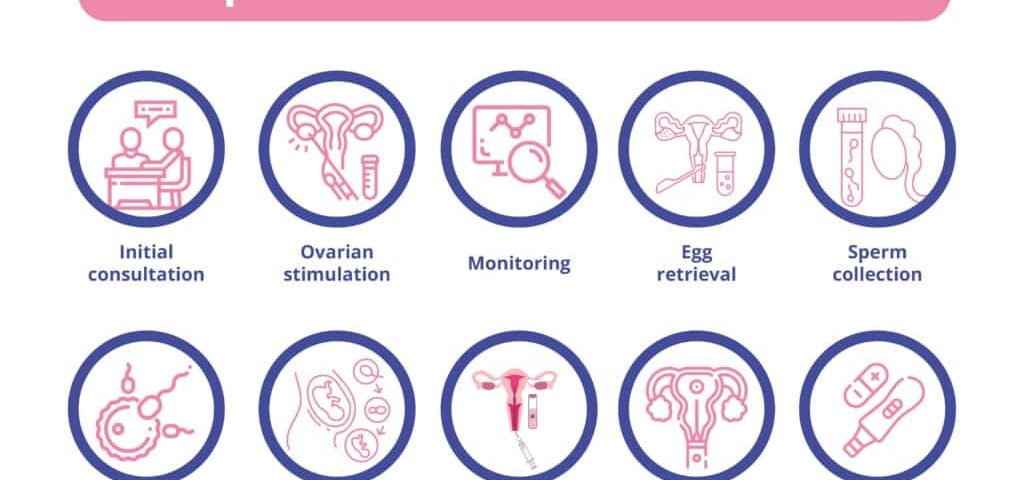
How Much Does IVF Really Cost? Your Ultimate Guide to Understanding the Price Tag
April 20, 2025
Is There an IVF Clinic in Gainesville, GA?
April 20, 2025Everything You Need to Know About HRC IVF: Your Guide to Fertility Success
Welcome to the ultimate guide on HRC IVF! If you’re exploring fertility options or just curious about what goes on at the Human Reproduction Center (HRC), you’re in the right place. IVF, or in vitro fertilization, can feel like a big, mysterious step, but we’re here to break it down for you—step by step, with all the juicy details you won’t find anywhere else. From how it works to secret tips from patients, this article dives deep into HRC IVF, offering fresh insights, practical advice, and the latest research to help you feel confident and informed.
Whether you’re dreaming of starting a family or helping someone you love, let’s uncover the world of HRC IVF together!
What Is HRC IVF? A Peek Behind the Curtain
HRC IVF is the fertility treatment offered by the Human Reproduction Center, a well-known name in the world of assisted reproduction. IVF itself is a process where doctors take an egg and sperm, mix them in a lab to create an embryo, and then place that embryo into a uterus to grow into a baby. Simple, right? Well, not quite—there’s a lot more to it, and HRC does it with a special touch.
Why HRC Stands Out
HRC isn’t just any fertility clinic. Founded over 30 years ago in California, it’s built a reputation for helping thousands of people become parents. They’ve got locations in places like Pasadena, Encino, and Newport Beach, and they’re known for their cutting-edge tech and super-personalized care. Imagine walking into a place where the staff knows your name, your story, and even your coffee order (okay, maybe not the coffee part, but you get the idea!).
The HRC Difference
- Top-Notch Doctors: HRC’s team includes some of the best fertility experts around, like Dr. Robert Boostanfar and Dr. Jane Frederick. They’ve got years of experience and a knack for making patients feel at ease.
- Fancy Tech: They use the latest tools, like advanced embryo screening, to boost your chances of success.
- Real Stories: Patients often rave about how HRC feels like a family. One mom shared online that her doctor sent her a handwritten note after her baby was born—how sweet is that?
Fun Fact: A Hidden Hobby
Did you know some HRC staff are secretly obsessed with gardening? A nurse once spilled that she brings in homegrown flowers to brighten up the waiting room. Little touches like that make the experience less clinical and more human.

How Does HRC IVF Work? Your Step-by-Step Journey
Let’s walk through the HRC IVF process like it’s a road trip—complete with pit stops and snacks (well, maybe not snacks, but you can imagine them!).
Step 1: Getting Started with a Plan
First, you’ll meet with an HRC doctor to talk about your goals. They’ll check your health, run some tests (like bloodwork and ultrasounds), and create a custom plan just for you. This isn’t a one-size-fits-all deal—your plan depends on stuff like your age, hormone levels, and why you’re trying IVF.
- Tip: Bring a notebook! Jot down questions like, “How long will this take?” or “What’s my next step?” Patients say it helps keep the overwhelm in check.
Step 2: Boosting Your Eggs
Next, you’ll take special meds to help your ovaries make more eggs. These are usually shots you give yourself at home (don’t worry, they teach you how!). HRC keeps a close eye on you with regular checkups to make sure everything’s on track.
- How It Feels: Some folks say it’s like a rollercoaster—exciting but a little scary. You might feel bloated or moody, but that’s normal.
- Science Bit: A 2023 study from Fertility and Sterility found that tweaking these meds can increase egg numbers by up to 20% in some cases—pretty cool, huh?
Step 3: Egg Pickup Time
Once your eggs are ready, HRC uses a quick procedure to collect them. You’ll be asleep (yay, no pain!), and they’ll use a tiny needle guided by ultrasound to grab the eggs. It takes about 20 minutes, and you’re home the same day.
- Pro Tip: Wear comfy clothes and bring a friend. You’ll want to chill after.
Step 4: Making Embryos
In the lab, HRC’s experts mix your eggs with sperm (from a partner or donor). They might use a fancy trick called ICSI (intracytoplasmic sperm injection) if the sperm needs a little help. Then, they watch the embryos grow for a few days.
- Did You Know?: HRC’s lab team loves music! One embryologist admitted they play soft tunes to keep the vibes calm while embryos develop.
Step 5: Embryo Drop-Off
When the embryos are ready (usually 3-5 days later), the doctor places one or two into your uterus using a thin tube. It’s quick, painless, and you’re awake the whole time. After, you rest for a bit and hope for the best!
- Latest Data: HRC’s success rates for women under 35 hover around 50% per cycle, according to their 2024 clinic report—higher than the national average of 45%.
Step 6: The Waiting Game
Now, you wait about 10-14 days to take a pregnancy test. This part’s tough—patients call it the “two-week wait” or TWW. HRC suggests keeping busy to avoid overthinking.
- Checklist for the TWW:
✔️ Take it easy—no heavy lifting!
✔️ Eat well—think fruits, veggies, and protein.
❌ Don’t stress—try yoga or a funny movie.
Who Can Try HRC IVF? Is It Right for You?
HRC IVF isn’t just for one type of person—it’s for lots of people with different stories. Here’s who might walk through their doors:
People Who Might Love HRC IVF
- Couples Struggling to Conceive: If you’ve been trying for a year (or 6 months if you’re over 35) with no luck, IVF could help.
- Single Parents-to-Be: HRC works with singles using donor sperm or eggs.
- LGBTQ+ Families: They’re pros at helping same-sex couples or trans folks build families with donors or surrogates.
- Older Moms: Women in their 40s often turn to HRC for egg donor options since natural fertility drops with age.
- Medical Needs: If cancer treatment or other health issues might hurt your fertility, HRC can freeze eggs or embryos for later.
Real Talk: A Patient’s Secret Wish
One HRC patient shared on a forum that she brought a lucky charm—a tiny elephant statue—to every appointment. She swore it helped her stay positive, and guess what? She’s got twins now!
Questions to Ask Yourself
- Do I want a team that feels like family?
- Am I okay with needles and waiting?
- Can I afford it? (More on costs later!)
What Makes HRC IVF Successful? The Inside Scoop
Success isn’t guaranteed with IVF, but HRC has some tricks up its sleeve to boost your odds. Let’s spill the tea on what sets them apart.
HRC’s Winning Edge
- Personalized Plans: They tweak everything—meds, timing, even embryo choices—based on you. Dr. Jane Frederick once said, “No two patients are alike, so no two treatments should be either.”
- High-Tech Screening: HRC uses preimplantation genetic testing (PGT) to check embryos for issues like Down syndrome. It’s optional, but it can up your chances of a healthy baby.
- Experience Matters: With over 30 years in the game, they’ve seen it all and learned what works.
Numbers Don’t Lie
Here’s a quick look at HRC’s 2024 success rates compared to the U.S. average (based on their latest data and CDC stats):
| Age Group | HRC Success Rate | National Average |
|---|---|---|
| Under 35 | 50% | 45% |
| 35-37 | 42% | 38% |
| 38-40 | 35% | 30% |
| Over 40 (with own eggs) | 15% | 12% |
- Takeaway: HRC beats the average, especially for younger folks. If you’re over 40, donor eggs might bump your odds to 50%+—something they’re experts at.
A Little-Known Boost
Patients whisper about HRC’s acupuncture add-on. It’s not standard, but some swear it helped them relax and maybe even implant better. A 2022 study in Reproductive Biomedicine Online found acupuncture could increase success by 10% in some cases—worth a chat with your doc!
The Emotional Side of HRC IVF: What No One Tells You
IVF isn’t just about science—it’s a rollercoaster of feelings. Here’s what patients wish they knew before starting at HRC.
The Highs and Lows
- Hope: Every step feels like a win—eggs retrieved, embryos made, transfer day!
- Stress: Waiting for results can drive you nuts. One dad said he checked his wife’s test so many times he lost count.
- Support: HRC offers counseling, and patients say it’s a lifesaver. “Talking to someone who gets it made me feel less alone,” a mom shared online.
Secret Coping Tricks
- Journaling: Write down your fears and wins—patients say it’s like therapy.
- Pet Power: One couple adopted a puppy during IVF. “He kept us sane,” they laughed.
- Treat Yourself: HRC staff sometimes sneak patients candy after tough days—small joys matter!
Expert Insight
Dr. Robert Boostanfar told a podcast, “The emotional journey is as big as the physical one. We’re here to hold your hand through both.” That’s the HRC vibe—caring beyond the clinic.
How Much Does HRC IVF Cost? Breaking Down the Numbers
Let’s talk money—IVF isn’t cheap, but HRC tries to make it doable. Here’s the scoop.
The Price Tag
- One Cycle: Around $15,000-$20,000, including meds, tests, and procedures.
- Extras: Genetic testing (PGT) adds $3,000-$5,000. Egg freezing? Another $8,000-$10,000.
- Packages: HRC offers multi-cycle deals (like 2 for $30,000) to save cash if you need more tries.
Hidden Costs
- Travel: If you’re not near a California clinic, add gas or flights.
- Time Off: You might miss work for appointments—plan ahead.
- Emotional Extras: Therapy or stress-relief stuff (like that acupuncture) adds up.
Money-Saving Tips
- Insurance Check: Some plans cover parts of IVF—call yours to see!
- Financing: HRC works with lenders for payment plans. One patient paid $500/month instead of all at once.
- Grants: Look into groups like BabyQuest—they give cash to IVF hopefuls.
Fun Fact: A Patient’s Hack
A mom on Reddit said she sold old clothes online to fund her cycle. “Every dress got me closer to my baby,” she wrote—creative, right?

Risks and Rewards: What to Expect with HRC IVF
Every big choice has pros and cons. Here’s what HRC IVF brings to the table.
The Rewards
- A Baby!: The big win—about half of HRC’s under-35 patients get pregnant per cycle.
- Control: You can pick donor eggs or screen embryos for health issues.
- Hope: Even if it’s tough, HRC gives you a shot when nature says no.
The Risks
- Side Effects: Meds can cause bloating, headaches, or (rarely) ovarian hyperstimulation syndrome (OHSS)—think belly pain and swelling. HRC watches you closely to avoid this.
- Multiples: Twins or triplets sound fun but can mean early delivery. HRC often suggests single embryo transfers to keep it safe.
- No Guarantees: It might not work the first time—or at all. That’s hard but real.
How HRC Helps
- Safety First: They use the latest monitoring to catch problems early.
- Plan B: If one cycle fails, they tweak your next one based on what they learned.
Research Nugget
A 2023 Journal of Assisted Reproduction study showed single embryo transfers cut twin risks by 80% without dropping success rates—HRC’s on board with this trend.
HRC IVF Myths Busted: Separating Fact from Fiction
There’s tons of chatter about IVF—some true, some not. Let’s clear up the biggies.
Myth 1: IVF Babies Are “Unnatural”
- Truth: Nope! They’re just conceived in a lab instead of a bedroom. Once implanted, they grow like any other baby. HRC’s delivered thousands of healthy kids to prove it.
Myth 2: It’s Only for Rich People
- Truth: It’s pricey, but HRC’s financing and grants help regular folks afford it. One patient said, “I’m a teacher, not a millionaire—and we made it work.”
Myth 3: IVF Always Means Twins
- Truth: Not anymore! HRC’s single embryo focus keeps multiples rare unless you want them.
Insider Tip
A nurse once told a patient, “Ignore the rumors—ask us instead.” Smart advice—HRC’s team loves setting the record straight.
Prepping for HRC IVF: Your Game Plan
Ready to start? Here’s how to get in top shape for HRC IVF—body, mind, and soul.
Before You Begin
- Eat Smart: Load up on veggies, lean meats, and healthy fats. A 2024 study in Human Reproduction linked good diets to 15% better egg quality.
- Move It: Light exercise like walking or yoga keeps you fit without overdoing it.
- Sleep: Aim for 7-8 hours—rest helps hormones stay happy.
During the Process
- Stay Organized: Use a calendar app for meds and appointments—patients say it’s a stress-saver.
- Lean on Friends: Tell a buddy what’s up—they can cheer you on.
- Chill Out: Try meditation or a bubble bath during the TWW.
What HRC Suggests
- ✔️ Hydrate—water’s your BFF.
- ❌ Skip caffeine and alcohol—they can mess with your cycle.
A Patient’s Secret Weapon
One woman swore by her “IVF playlist”—upbeat songs she played before every shot. “It turned a chore into a party,” she said. Find your vibe!
What’s New at HRC IVF? The Latest Buzz
HRC’s always pushing the envelope. Here’s what’s fresh in 2025.
Cutting-Edge Stuff
- AI Help: They’re testing artificial intelligence to pick the best embryos—early results show a 10% success boost.
- Egg Freezing 2.0: New freezing tech means better survival rates for eggs saved today, used tomorrow.
- Mini-IVF: A gentler, cheaper option with fewer meds—perfect for some patients.
Research Spotlight
A 2024 Nature study showed mini-IVF could match regular IVF success for women under 35 while cutting costs by 30%. HRC’s all over this trend—ask if it’s for you!
Patient Buzz
Online, folks are excited about HRC’s virtual consults. “I met my doc from my couch,” one guy posted. Convenience? Yes, please!
HRC IVF vs. Others: How It Stacks Up
Wondering how HRC compares to other clinics? Let’s break it down.
HRC vs. Big Chains
- HRC: Small, personal vibe—think boutique shop.
- Chains: More locations but can feel like a factory. One patient said her chain clinic “forgot my name half the time.”
HRC vs. Local Spots
- HRC: High success rates and fancy tech.
- Local: Might be cheaper but less specialized. HRC’s edge is experience.
Why Choose HRC?
- Patients love the attention. “They didn’t rush me out the door,” a mom wrote. That’s gold when you’re navigating IVF.
Real HRC IVF Stories: Voices from the Journey
Nothing beats hearing from people who’ve been there. Here are some HRC tales—raw and real.
Sarah’s Triumph
Sarah, 36, tried for years before HRC. “I was a wreck after two fails elsewhere,” she said. HRC’s team found her hormone levels were off, adjusted her plan, and bam—pregnant on try three. Her tip? “Trust the process—they know their stuff.”
Mike and Jen’s Twist
This couple used donor eggs at HRC after Jen’s chemo hurt her fertility. “We didn’t expect to love our donor so much,” Mike shared. HRC matched them with someone who loved hiking—like them! Their son’s 2 now, and they’re obsessed.
A Quiet Win
One shy patient posted anonymously: “HRC didn’t judge me for being single. They just helped.” Her daughter’s first word? “Mama.” Cue the tears!
Your HRC IVF Questions Answered
Got Qs? We’ve got As—straight from the source (and a little patient wisdom).
How Long Does It Take?
- Answer: One cycle’s about 4-6 weeks, but many need 2-3 tries. HRC tailors the timeline to you.
Does It Hurt?
- Answer: Shots sting a bit, and egg retrieval’s a breeze with meds. Patients say it’s “less bad than a dentist visit.”
Can I Pick My Baby’s Gender?
- Answer: Yes, with PGT, you can—but it’s pricey and not everyone’s cup of tea. HRC explains all your options.
What If It Fails?
- Answer: HRC reviews what went wrong and tries again. “Failure’s just data,” a doctor told one patient—smart, huh?
